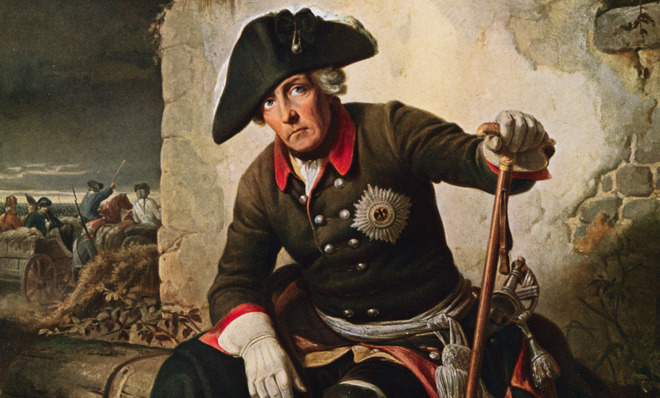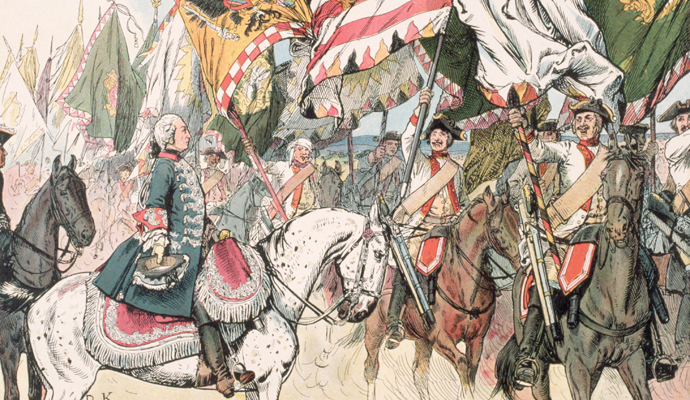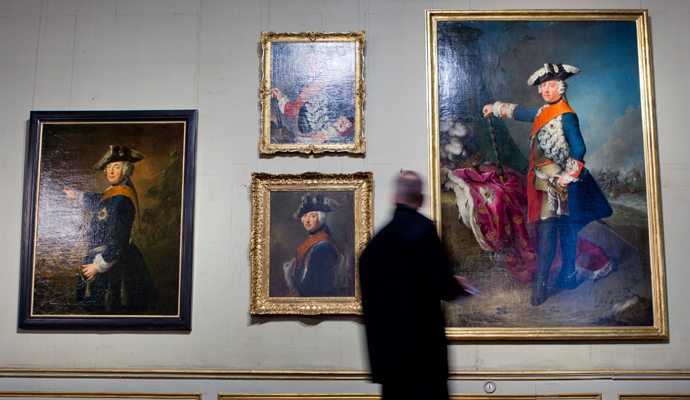History’s greatest gay general
No, not Alexander the Great — Frederick the Great

A free daily email with the biggest news stories of the day – and the best features from TheWeek.com
You are now subscribed
Your newsletter sign-up was successful

Frederick the Great is one of history's most famous and adept military commanders. He's not Napoleon, but pretty damn close.
The 18th-century Prussian king is credited with transforming a backwater patchwork of Baltic lands into a modern state — all while fending off armies four times the size of his own. He was an infamous disciplinarian, a ruthless commander, and a military genius.
He was the symbol of Prussian masculinity and militarism, and he was also most likely gay.
The Week
Escape your echo chamber. Get the facts behind the news, plus analysis from multiple perspectives.

Sign up for The Week's Free Newsletters
From our morning news briefing to a weekly Good News Newsletter, get the best of The Week delivered directly to your inbox.
From our morning news briefing to a weekly Good News Newsletter, get the best of The Week delivered directly to your inbox.
A 'Grecian' taste in love
Frederick's sexuality isn't noteworthy by itself, but it's surprising that his love for men was considered a matter of fact in the macho world of 18th-century Prussia.
First, we have to get one thing out of the way. Debating the sexuality of historical figures from centuries ago is fraught with politics and conflicting social theories. Homosexuality is innate — at least it is for me — but the social conception of what being gay means has varied over time.
Where we use the word "orientation" today, 18th-century writers would call it a "taste." For some figures like Abraham Lincoln, the evidence is in the mash notes he wrote to his presumed boyfriend. But didn't straight guys use to speak to each other in more intimate ways than they do now?
A free daily email with the biggest news stories of the day – and the best features from TheWeek.com
This matter is further complicated by how later historians — who either loved or hated him — dealt with Frederick's sexuality. It was so widely known, the late historian Louis Crompton wrote in his book Homosexuality and Civilization, that historians had trouble reconciling Frederick's sexuality with his greatness.
Several biographies have more than a whiff of homophobia.
In his hagiography of the king, historian Thomas Carlyle rejected assertions that Frederick was gay as a "thrice-abominable rumor" spread by those with a "solacement to human malice and impertinent curiosity."
Some of these "rumors" likely were salacious. The historian Thomas Babington Macauley wrote that Frederick was prone to "vices from which history averts her eyes, and which even Satire blushes to name."
Macauley was notoriously hostile to Frederick, and wrote that the king was a "haughty, vigilant, resolute, sagacious blue-stocking, half Mithridates, and half Trissotin."
But is it impertinent to talk about it? Not according to numerous accounts at the time.
In 1788, two years after the king's death, the historian Johann Georg Zimmermann noted that Frederick was widely known to have — in perhaps a nod to Alexander the Great — a "Grecian taste in love."
Added Zimmermann:
Voltaire, [the poet Laurent] la Beaumelle, the [French foreign minister] Duke de Choiseul, innumerable Frenchman and Germans, almost all the friends and enemies of Frederick, almost all the princes and great men of Europe, even his servants — even the confidants and friends of his later years, were of opinion that he had loved, as it is pretended, Socrates loved Alcibiades.
But even Zimmermann tried to straighten his hero, spinning a dubious and far-fetched theory that Frederick wasn't gay, he just wanted other people to think he was.
According to this theory, Frederick had been medically castrated after contracting gonorrhea. Being without his grapes wouldn't fit the image of a military commander, Zimmermann's theory goes — though there's no evidence Frederick was castrated — so he played gay.
"It seems few people ever believed Zimmermann's denials," wrote historian Alistair Blanchard. "Frederick the Great's reputation as one of the world's most famous homosexuals seems secure."

'There can be neither love nor friendship'
Frederick was born in 1712 at a time when Prussia was a military-dominated patchwork of titles and lands scattered from present-day Lithuania, Poland to across northern Germany.
Four years before he was born, one-third of the kingdom's population died of plague. Prussia was a resource-poor backwater surrounded by larger powers: Sweden, the Polish-Lithuanian Commonwealth, and the Hapsburg empire in Austria. It wasn't a great place to grow up.
Frederick's father, the Prussian king Frederick William I, was by most accounts a violent, bigoted, and abusive tyrant.
According to Crompton, the king's "principal passion in life was his regiment of 'giants,' tall soldiers whom he collected from all over Europe, sometimes having them kidnapped."
In Frederick William's edict of 1725, he ordered the strangling of all Roma found within his kingdom, "while sodomites would be burned alive." At least three people were executed for sodomy between 1700 and 1730.
The young Frederick, despite later becoming a world-famous military commander, didn't particularly like the military. He was attracted to French culture, poetry, and the flute. He liked fine clothes. His father hated his "effiminate boy" for these "lascivious and womanly activities."
When Frederick was 16, his father exiled his page, Peter Christoph Keith, after Frederick and the Keith became "inseparable" — a word used by Wilhemine, Frederick's sister.
Shortly thereafter, Frederick attempted to flee the kingdom with Hans Hermann von Katte, his confidant, apparent lover, and elder of six years. The two were captured during an escape attempt. His father ordered von Katte beheaded — and forced Frederick to watch.
As the executioner's blade sliced off von Katte's head, Frederick passed out. Accounts suggest he became inconsolable.
Frederick's father then exiled him to a small village until 1732. During his stay, he kept a close friendship with a count who Frederick gave the romantic nickname "Cesarion." Crompton notes the French ambassador to Prussia commented on this relationship, and that Frederick kept Cesarion away from the windows so he wouldn't be seen.
The prince also met another friend, an army private from a peasant background named Michael Gabriel Fredersdorf. "This soldier, young, handsome, well made, and who played the flute, served to entertain the prisoner in more than one fashion," the French writer and philosopher Voltaire winked.
In a personal letter, Voltaire would compare Frederick to the gay lover of ancient Bithynian king Nicomedes IV.
However, the realities of 18th-century nobility required Frederick to marry straight. His father ordered him to marry the German duchess Elisabeth Christine of Brunswick-Bevern.
"There can be neither love nor friendship between us," Frederick wrote to his sister about his upcoming marriage, according to Crompton. In another letter, Frederick stated his intention to marry Elizabeth, then tell her "bon voyage."
Frederick would keep Fredersdorf — not Elisabeth — close throughout the rest of his life. After becoming king, Frederick promoted Fredersdorf to the position of chancellor, and gave him his own private estate. This was scandalous to the Prussian nobility given the chancellor's common background.
By contrast, Elizabeth was given her own palace in Berlin and kept away from Frederick's court at Potsdam. She never set foot in it. This distant, loveless marriage was Frederick's only known relationship with a woman.

Military innovation
In the Silesian Wars, Frederick expanded the borders of his kingdom while parrying away much larger Austrian armies. During the Seven Years War, he fought off the combined forces of Austria, France, and Russia.
He effectively created modern Prussia, which would go on in the 19th century to unite Germany into a nation-state.
Frederick's military campaigns occurred during an odd historical period. Artillery, logistical networks, and fast-moving armies were only just beginning to develop into the well-oiled machines they are today.
Largely, armies were still largely structured on a model little different from the medieval era.
In Frederick's time, wars were fought between nobles, not between states or "peoples." Officers were drawn from the ranks of the upper classes and conscripts from the lower classes, with nearly zero opportunity for advancement.
If armies were not watched carefully, ordered to march at night, or were encamped near forests, hundreds of soldiers could very well run away. Frederick's armies were also manned mostly by mercenaries.
Battles were also fought quite differently. Direct fighting was almost suicidal. Armies could not effectively exploit a tactical advantage — and that allowed the enemy army to retreat with much of its force still intact. Worse, Prussia's armies were generally outnumbered.
Faced with these disadvantages, Frederick adopted a tactic known as the oblique order of battle. This concentrated his attacking forces on a single flank, allowing his smaller armies to have a numerical advantage where it counted.
As this required a great deal of cohesion — no backsies when the unit begins to attack — Frederick instituted arguably the strictest drills and discipline of the time. He brought back cadenced marching — meaning that soldiers march in-step with each other — considered a relic from the Roman Empire.
Frederick might not have been aware of it, but this tactic was first developed by Theban forces against the Spartans at the Battle of Leuctra in 371 BCE. The Sacred Band of Thebes — a fighting group comprised of 150 pairs of male lovers — formed a devastating strike force against the Spartan left flank.
It wasn't until late in Frederick's military career that his enemies, particularly the Hapsburgs, developed countermeasures, such as rapidly deploying units once detecting an oblique attack. But he had already repeatedly crushed their armies.
Still, despite Frederick's "greatness," it's hard to see the Prussian king becoming a gay hero. For one, there are lots of good reasons not to do that.
He was a military genius, but this was given added importance by the military's privileged status in autocratic Prussia. He turned Prussia into a great power. But he entrenched the rule of the Junkers, Prussia's landed nobility, which would have disastrous effects on Germany's later political development.
He had a nasty bigotry for Poles and launched unprovoked, expansionist wars. Frederick would also go on to be glorified by the Nazis and Adolf Hitler, though Frederick would have likely found many aspects of Nazi ideology to be incomprehensible.
Frederick reformed some laws in autocratic Prussia. He repealed the death penalty for sodomy, encouraged scientific research, and granted religious asylum for persecuted Jesuits. But ultimately, he is remembered as a symbol of 18th-century conservatism — which itself would be overthrown by the French Revolution and Napoleon.
So a gay hero? No. But he was definitely a great gay general.
From drones to AKs, high technology to low politics, War is Boring explores how and why we fight above, on, and below an angry world. Sign up for its daily email update here or to its RSS feed here.
More from War is Boring...
-
 The best music tours to book in 2026
The best music tours to book in 2026The Week Recommends Must-see live shows to catch this year from Lily Allen to Florence + The Machine
-
 Gisèle Pelicot’s ‘extraordinarily courageous’ memoir is a ‘compelling’ read
Gisèle Pelicot’s ‘extraordinarily courageous’ memoir is a ‘compelling’ readIn the Spotlight A Hymn to Life is a ‘riveting’ account of Pelicot’s ordeal and a ‘rousing feminist manifesto’
-
 The EU’s war on fast fashion
The EU’s war on fast fashionIn the Spotlight Bloc launches investigation into Shein over sale of weapons and ‘childlike’ sex dolls, alongside efforts to tax e-commerce giants and combat textile waste